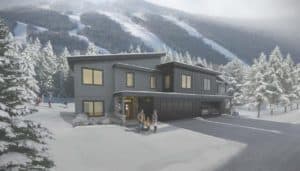
The Base Camp townhomes at Bear Mountain will be the first ski-on, ski-off gated community at Killington. The 78 slopeside townhomes in two multi-family buildings will be two-story, four-bedroom homes with two car garage parking, home offices, floor-to-ceiling windows and mountain views. Nine duplexes are also planned with sales currently underway.
The ‘Base Camp at Bear Mountain’ development includes 156 units, capacity for 872 occupants
By Curt Peterson
Killington/Pico Ski Resort Partners’ application to Killington’s Development Review Board (DRB) went smoothly until questions came up about safety and fire protection.
When Selectman Jim Haff and DRB members Roger Rivera and Vito Rasenas raised those issues, the April 15 public hearing was recessed so Steve Malone of Ottauquechee Realty Advisors could meet on April 16 with Killington Police Chief Whit Montgomery and Killington Volunteer Fire Dept. (KVFD) Chief Gary Roth to discuss any questions the town might have for the developers.
Chief Montgomery told the Mountain Times, “My questions were focused on traffic flow, road design, parking, road/building signage, pedestrian safety and speed,” adding that, at this time, he is satisfied with safety at the project.
Steve Malone said, “We are making modifications to the multi-family design … in order to comply with [KVFD] access requirements.” Discussions also included fire lanes, elevator size, propane tank and fire hydrant locations, sprinklers and water holding tank capacity, he said.
Known as “Base Camp at Bear Mountain,” the development would include 156 units, consisting of 18 duplex dwellings containing 36 four-bedroom townhouses, and four five-story “stack flat condo” buildings, each with 30 two- and three-bedroom condos. Prices will be in the $1.5 million-plus range.
“That’s a total of 436 bedrooms for the project,” Zoning Administrator Preston Bristow told the Mountain Times, “and a capacity of 872 occupants.”
A common well will provide water, with storage for a reserve supply. When Phase 2 is built, additional well water will be required. According to Bristow, Fire Chief Roth “wants more detail to ensure that hydrants and sprinkler systems will stay fully charged.”
Wastewater handling is more complicated.
“That goes into the Killington Resort wastewater treatment plan, which is fully approved and has sufficient capacity,” Bristow said. “The treated wastewater … is pumped over the mountain and is ultimately discharged into and through the Rutland wastewater treatment facility.”
Despite the fact that in 2020 the Rutland facility recorded more than two dozen “overflow” incidents, blamed on “heavy rain and aging pipes,” Amy Polaczyk, manager for the Watershed Management Division, Wastewater Management Program, told the Mountain Times Rutland’s wastewater treatment facility does not have a problem with sewage wastewater capacity.
“The combined sewer overflows that occur in Rutland are a function of the stormwater collection system being combined with the wastewater system,” Polaczyk said. “Those overflows occur due to precipitation events, not dry-weather loadings from service connections.”
“In small storms, … the first flush of pollutants carried by stormwater … go to the [Rutland plant] for treatment. In large storms, overflows may occur to avoid backups into houses and businesses,” she added. “Combined sewer overflows are mainly stormwater with a smaller percentage of untreated wastewater.”
Untreated overflows end up in East Creek and Otter Creek.
An application for wastewater approval by the Agency of Natural Resources is being prepared, Malone said.
If all necessary permits are secured and construction begins in August, as planned, Phase I will be finished in late spring 2022. Phase II would start in June of 2022 and be completed in September 2023.
A marketing study, Malone said, indicates most purchasers of Base Camp units will be using the properties themselves, and will not be offering them as short-term rentals and increasing the number of short-term rentals in Killington.
Dave McComb, of Killington Vacation Rentals, agrees with Malone.
“High net worth people buying properties at the $1.7 million mark would not be using them for short term rentals,” McComb told the Mountain Times.
“I thought … prices were a bit crazy initially,” McComb added, “but I’ve since come to the realization that the market here was undervalued. Any development will take years, and, I would guess, be at higher prices than most current stock.”




